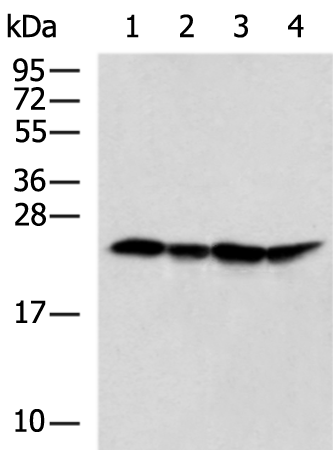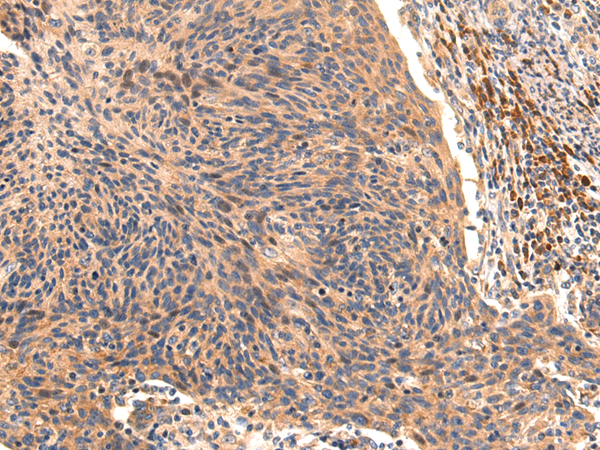

| WB | 咨询技术 | Human,Mouse,Rat |
| IF | 咨询技术 | Human,Mouse,Rat |
| IHC | 1/50-1/200 | Human,Mouse,Rat |
| ICC | 技术咨询 | Human,Mouse,Rat |
| FCM | 咨询技术 | Human,Mouse,Rat |
| Elisa | 1/5000-1/10000 | Human,Mouse,Rat |
| Aliases | S9 |
| WB Predicted band size | 23 kDa |
| Host/Isotype | Rabbit IgG |
| Antibody Type | Primary antibody |
| Storage | Store at 4°C short term. Aliquot and store at -20°C long term. Avoid freeze/thaw cycles. |
| Species Reactivity | Human, Mouse, Rat |
| Immunogen | Synthetic peptide of human RPS9 |
| Formulation | Purified antibody in PBS with 0.05% sodium azide and 50% glycerol. |
+ +
以下是关于RPS9抗体的3篇参考文献的简要整理:
---
1. **文献名称**:*RPS9 modulates the proliferation and invasion of hepatocellular carcinoma through ribosome biogenesis*
**作者**:Chen L, et al.
**摘要**:该研究利用RPS9抗体检测肝癌细胞中RPS9蛋白的表达水平,发现其过表达与肿瘤增殖和转移相关,提示RPS9可能通过调控核糖体生物合成促进肝癌进展。
2. **文献名称**:*A novel role for ribosomal protein S9 in cellular stress response*
**作者**:Smith J, et al.
**摘要**:通过RPS9抗体进行免疫共沉淀实验,发现RPS9在氧化应激条件下与应激颗粒蛋白相互作用,表明其参与细胞应激反应的调控机制。
3. **文献名称**:*RPS9 as a potential biomarker in colorectal cancer diagnosis*
**作者**:Wang Y, et al.
**摘要**:研究采用RPS9抗体对结直肠癌组织进行免疫组化分析,发现RPS9高表达与患者预后不良相关,提出其可作为潜在的诊断标志物。
---
以上文献均通过RPS9抗体探讨了该蛋白在疾病机制或分子功能中的具体作用,涉及肿瘤学、细胞应激及临床诊断等领域。如需具体期刊信息或发表年份,可进一步补充关键词检索。
The RPS9 antibody is a tool used to detect Ribosomal Protein S9 (RPS9), a component of the 40S ribosomal subunit involved in protein synthesis. RPS9. encoded by the RPS9 gene, is a conserved, ubiquitously expressed protein with a molecular weight of approximately 22 kDa. Structurally, it contributes to ribosome assembly and stability, playing a critical role in mRNA binding and translation fidelity. Beyond its canonical role in ribosome biogenesis, RPS9 has been implicated in non-ribosomal functions, including cell proliferation, apoptosis, and stress response pathways. Dysregulation of RPS9 expression is linked to various diseases, such as cancer (e.g., colorectal, breast) and Diamond-Blackfan anemia, a rare genetic disorder caused by ribosomal protein mutations.
RPS9 antibodies are widely used in research to study protein localization, expression levels, and interactions via techniques like Western blotting, immunohistochemistry, and immunofluorescence. They are also employed to explore ribosomal dysfunction mechanisms and validate disease models. Commercially available RPS9 antibodies are typically monoclonal or polyclonal, often validated for specificity using knockout controls or siRNA-mediated silencing. Due to potential cross-reactivity with homologous proteins, validation in specific experimental systems is essential. These antibodies serve as vital tools for unraveling ribosome-related cellular processes and their pathological implications.
×